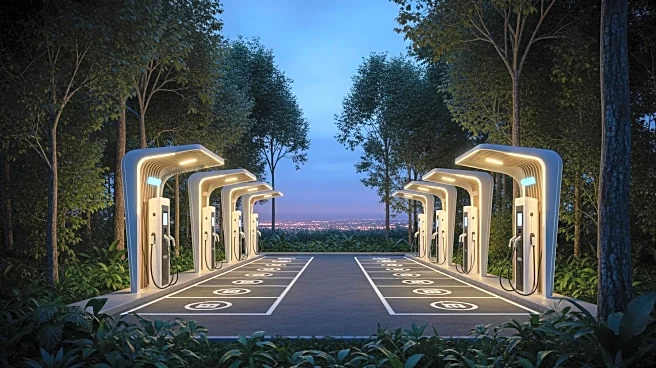What's Happening?
Chinese electric vehicle (EV) manufacturers are increasingly penetrating the Brazilian market, marking a significant shift in global automotive dynamics. Brands such as BYD and Great Wall Motor have seen
a substantial increase in imports to Brazil, with approximately 138,000 electric and hybrid vehicles imported from China in 2024, a notable rise from the previous year. This expansion is partly due to the barriers Chinese automakers face in the U.S. market, prompting them to focus on emerging economies like Brazil, which is South America's largest car market. Chinese models have captured over 80% of EV sales in Brazil as of early 2025, driven by affordability and strategic local production initiatives. BYD, for instance, has established a major production facility in Bahia, leveraging a former Ford site to produce up to 300,000 cars annually.
Why It's Important?
The influx of Chinese EVs into Brazil represents a strategic pivot for Chinese automakers, aiming to dominate emerging markets amid domestic pressures. This development could reshape the automotive landscape in Brazil, challenging established brands and potentially impacting local employment and production. The affordability of Chinese EVs, such as BYD's Dolphin Mini, offers competitive pricing compared to models from companies like General Motors, influencing consumer choices and market dynamics. However, the rapid expansion has raised concerns among labor groups about job security and production sustainability in Brazil. The Brazilian government's decision to re-impose import tariffs on foreign EVs by 2026 reflects efforts to balance market growth with domestic industry protection.
What's Next?
As Chinese automakers continue to invest in Brazil, the market is likely to see further shifts in consumer preferences and competitive dynamics. The re-imposition of import tariffs could alter the cost-benefit equation for Chinese brands, potentially affecting their market share. Labor groups and industry stakeholders may push for policies that safeguard local jobs and production capabilities. Additionally, scrutiny over labor practices at new production sites, such as BYD's Bahia plant, may lead to increased regulatory oversight and demands for improved working conditions. The long-term strategy of Chinese automakers to establish a foothold in emerging markets suggests ongoing investments and market development efforts.
Beyond the Headlines
The expansion of Chinese EVs in Brazil highlights broader geopolitical and economic trends, including China's strategic positioning in global markets and the shifting dynamics of international trade. The focus on emerging economies underscores the importance of adaptability and innovation in the automotive industry, as companies navigate regulatory changes and consumer demands. The situation also raises ethical considerations regarding labor practices and environmental impacts, prompting discussions on sustainable development and corporate responsibility. As Chinese automakers continue to influence market trends, their approach may serve as a model for other industries seeking to expand globally.








